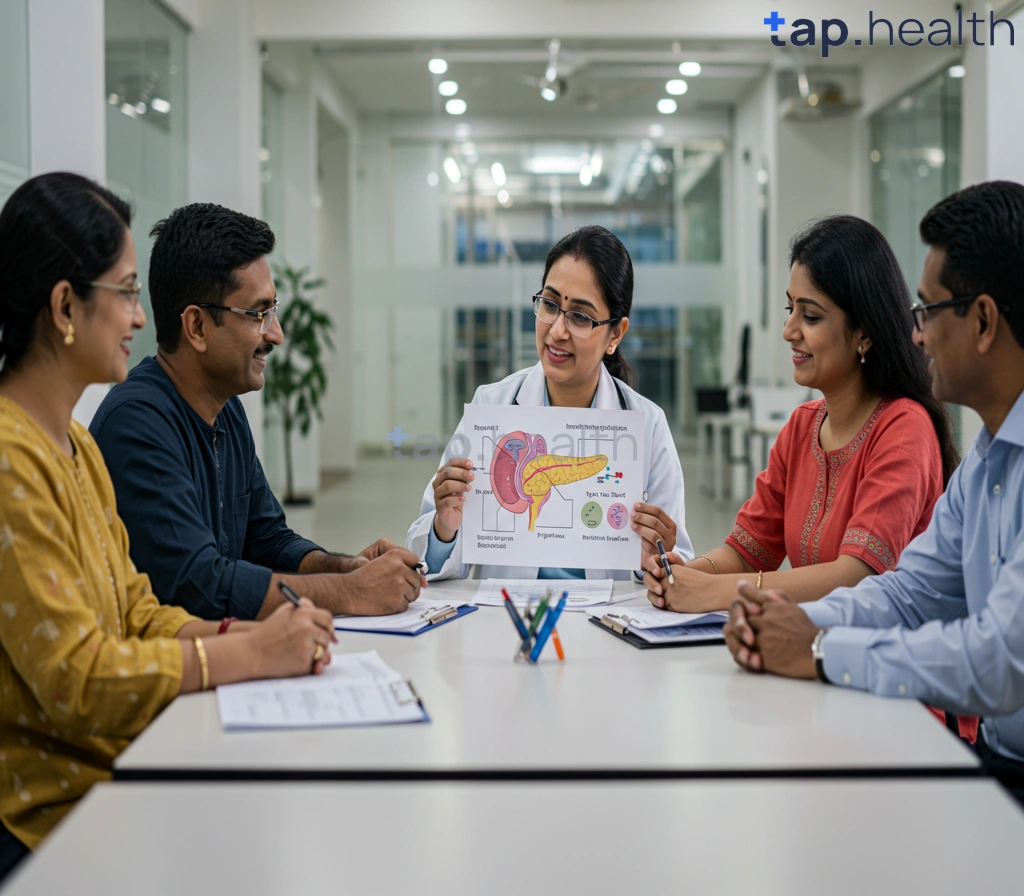Table of Contents
- Decoding Metabolism: How Endocrinology Impacts Diabetes
- Understanding Diabetes: A Nutritional Guide to Metabolic Health
- Nutrition Research and Endocrinology: Key Insights for Diabetes Management
- Metabolic Processes Explained: Research on Diabetes and Nutrition
- Diabetes and Metabolism: Latest Research in Endocrinology and Nutrition
- Frequently Asked Questions
- References
Ever wondered how your body transforms food into energy, or why some people struggle with weight management while others don’t? Understanding the intricate relationship between hormones, blood sugar, and nutrient utilization is key to unlocking a healthier you. That’s where Understanding Endocrinology, Diabetes, Metabolism, and Nutrition Research comes in. This blog delves into the fascinating world of these interconnected fields, providing clear, concise explanations of complex biological processes. We’ll explore the latest research findings and offer practical insights to help you make informed choices about your health and well-being. Get ready to embark on a journey of discovery!
Decoding Metabolism: How Endocrinology Impacts Diabetes
Diabetes—a metabolic puzzle affecting millions—hits the working-age population in many Indian and tropical countries particularly hard. Data shows a staggering 61% of those living with diabetes are between 20 and 64, creating serious economic and social ripples. Understanding the interplay between endocrinology, metabolism, and diabetes is key to better management and prevention, especially in these regions.
The Endocrine System’s Role
Think of your endocrine system as a hormonal orchestra, conducting your body’s metabolism. Glands release hormones like insulin, glucagon, and cortisol, which act as conductors, directing how your body uses glucose, fats, and proteins. In type 1 diabetes, this orchestra’s primary insulin-producing instrument (the pancreas) malfunctions, leading to high blood sugar (hyperglycemia). Type 2 diabetes, far more common, is like the cells ignoring the conductor’s instructions – they become resistant to insulin’s glucose-regulating signals. This often links to lifestyle choices prevalent in many tropical climates.
Metabolic Imbalances and Diabetes
Metabolic imbalances, such as impaired glucose tolerance and insulin resistance, pave the way for type 2 diabetes. It’s often a mix of inherited tendencies and environmental factors—think diet and activity levels. The high prevalence in tropical countries emphasizes the need for culturally sensitive health strategies. The strong connection between obesity and diabetes, as discussed in Understanding the Link Between Diabetes and Obesity, further highlights this.
Practical Steps for Prevention and Management
With diabetes significantly impacting the 20-64 age group in India and tropical nations, prevention is paramount. This means embracing healthy lifestyles: balanced diets rich in fresh, local produce, regular exercise adapted to the climate, and consistent blood glucose monitoring. Early detection and management are crucial to avoid long-term complications. A personalized plan from your doctor is essential. And as we age, managing diabetes takes on new challenges, expertly covered in Managing Diabetes as You Age: Challenges and Solutions.
Understanding Diabetes: A Nutritional Guide to Metabolic Health
Managing Blood Sugar Levels Through Diet in Tropical Climates
Diabetes management in hot, humid climates like India presents unique challenges. While the general carb recommendation is around 45-60 grams per meal, this is just a starting point. Your individual needs depend heavily on factors like activity level, body type, and even the weather. The heat and humidity can affect your appetite and how your body uses energy, making it tricky to predict how your blood sugar will respond.
Carb Counting and Meal Planning for Effective Diabetes Management
Smart carb choices are key. Think whole grains like brown rice and millets, legumes such as lentils and beans, and plenty of non-starchy vegetables. These offer sustained energy, unlike refined carbs (white rice, white bread, sugary sodas) that lead to blood sugar spikes. Fiber in these foods helps too—it slows digestion and prevents those sudden blood sugar jumps. Portion control is crucial, though; even healthy carbs add up! For more in-depth guidance, check out our guide: 10 Proven Tips to Effectively Manage Diabetes.
Regional Dietary Adaptations for Improved Metabolic Health
Embrace local, seasonal produce! Mangoes, papaya, and leafy greens are packed with antioxidants and fiber, offering natural sweetness without the blood sugar rollercoaster of refined sugar. But remember, everyone’s different. A registered dietitian specializing in diabetes can help you craft a personalized plan that fits your lifestyle and preferences perfectly. They’ll factor in your cultural food habits and individual health needs, making diabetes management more sustainable and less of a struggle. A tailored approach is really the key to long-term success. Need more support? See our article: 10 Proven Tips for Effective Diabetes Management.
Nutrition Research and Endocrinology: Key Insights for Diabetes Management
Managing diabetes effectively in India and other tropical regions requires understanding the complex relationship between diet, hormones, and metabolism. It’s a delicate dance, especially given the prevalent dietary habits and health conditions in these areas. Poor blood sugar control can lead to serious problems like diabetic nephropathy (kidney disease), affecting a staggering 30% of people with diabetes. That’s why getting our nutrition right is so crucial.
The Role of Diet in Diabetes Management
What we eat dramatically affects our blood sugar and overall health. Many diets in tropical regions are high in carbs – think rice, refined sugars, and processed foods – which can be tough on blood sugar levels. The good news is we can make a real difference by shifting to a balanced diet rich in whole grains (like brown rice or millets), lean protein (fish, lentils), and plenty of fruits and vegetables. This helps keep blood sugar stable, manage weight, and lower the risk of complications.
Think of it like this: imagine your body’s engine – refined carbs are like using low-grade fuel, while a balanced diet provides premium fuel for optimal performance. Plus, traditional Indian cooking, with its amazing array of fresh produce and anti-inflammatory spices, offers tons of delicious, diabetes-friendly options! But managing emotional eating is also key – learn more at Addressing Emotional Eating in Diabetes: Strategies.
Personalized Nutrition Plans for Diabetes
Because everyone’s metabolism is unique, a personalized approach is essential. Working with a registered dietitian or certified diabetes educator is invaluable. They can help create a plan tailored to your individual needs and preferences, considering your lifestyle and cultural background. Regular blood sugar monitoring and dietary adjustments are vital for long-term success.
This proactive strategy – combining science with culturally sensitive approaches – is the key to better health outcomes. And while diet is paramount, understanding how to safely use supplements can also be beneficial. Check out our blog on Safe and Effective Dietary Supplements for Diabetes Care for more information.
Metabolic Processes Explained: Research on Diabetes and Nutrition
Understanding Metabolism in Tropical Climates
Our bodies are amazing energy factories! Metabolism – the intricate process of turning food into fuel – is hugely influenced by what we eat and our genes. This is especially vital when considering diabetes, since over 75% of people with diabetes live in low- and middle-income countries, many in tropical regions like India. The IDF Diabetes Atlas paints a clear picture of this global disparity, highlighting the urgent need for research tailored to these specific environments. Nutritional deficiencies, unfortunately common in many developing nations, can really throw a wrench into healthy metabolism and significantly increase diabetes risk. Think of it like trying to run a car on low-quality fuel – it’s not going to perform well.
Diabetes, Nutrition, and Regional Challenges
Managing diabetes effectively hinges on understanding how our food choices impact our metabolism. In India and other tropical countries, traditional diets play a huge role – a double-edged sword, really. While staple foods like rice and certain grains are often high in carbohydrates, potentially problematic for diabetes management, many regions boast an abundance of fresh, vibrant fruits and vegetables that can significantly improve blood sugar control. However, consistent access to nutritious food and quality healthcare is a major hurdle for many. And let’s not forget stress – check out this insightful article on how stress hormones affect diabetes.
Actionable Steps for Improved Metabolic Health
To tackle this, we need region-specific solutions. We need to develop nutritional guidelines and accessible healthcare that are culturally relevant. Imagine creating diabetes education programs that resonate with local communities, using familiar food examples and language – this is key. Focusing research on local dietary patterns and empowering people with the knowledge to make informed choices is essential. It’s also crucial to consider the interconnectedness of metabolic conditions; learn more about the link between diabetes and fatty liver. Making small, sustainable changes can have a huge impact on long-term metabolic health.
Diabetes and Metabolism: Latest Research in Endocrinology and Nutrition
The global diabetes crisis is truly alarming. The IDF Diabetes Atlas projects a staggering increase, from 9.8% prevalence in 2021 to a projected 11.2% by 2045—that’s nearly 800 million people aged 20-79! This surge underscores the critical need for cutting-edge research in endocrinology, metabolism, and nutrition, especially in regions like India and other tropical countries where the prevalence is often higher. Why? A complex interplay of genetics, lifestyle, and environmental factors.
Understanding the Complexities
Research in tropical regions demands a nuanced approach. We can’t just apply Western models; we need to understand unique dietary habits and environmental conditions. Studies are increasingly focusing on the glycemic index of locally consumed foods and how they affect blood sugar. Imagine the difference between a diet rich in refined rice versus one with more complex carbohydrates like millets. It’s also about genetics – some populations might be genetically predisposed to insulin resistance. Plus, factors like heat, humidity, and the prevalence of infectious diseases can all influence metabolic processes. Luckily, technology is offering exciting new tools for blood sugar management. Check out our blog on technological advances in diabetes care for more.
Actionable Steps for Improved Outcomes
Effective diabetes management in India and other tropical countries needs a holistic strategy. It’s not a one-size-fits-all solution. Think: a balanced diet using readily available local foods, regular physical activity adapted to the climate (morning walks might be preferable to midday runs!), and consistent blood glucose monitoring. Crucially, working with healthcare professionals familiar with local challenges is essential for personalized plans. Increased research funding and public awareness are vital to combat this crisis and improve health outcomes. And don’t forget, managing diabetes often means addressing other conditions too, like high cholesterol. Learn more about that in our blog on managing cholesterol with diabetes.
Frequently Asked Questions on Endocrinology, Diabetes, Metabolism, and Nutrition Research
Q1. What is the connection between endocrinology, metabolism, and diabetes?
The endocrine system regulates metabolism through hormones like insulin and glucagon. In type 1 diabetes, the pancreas malfunctions, while in type 2 diabetes, cells become resistant to insulin, leading to high blood sugar. Metabolic imbalances, often linked to lifestyle and genetics, contribute significantly to type 2 diabetes.
Q2. How can diet help manage diabetes, particularly in tropical climates?
Prioritize whole grains (brown rice, millets), legumes (lentils, beans), and non-starchy vegetables for sustained energy. Limit refined carbs to avoid blood sugar spikes. Consider your activity level, body type, and the climate’s impact on appetite when planning meals. A registered dietitian can personalize your plan.
Q3. What are the key challenges in managing diabetes in tropical regions like India?
High prevalence of diabetes in the working-age population creates significant economic and social burdens. Traditional diets may be high in carbs, access to nutritious food and healthcare can be limited, and cultural factors must be considered when creating effective management plans. Emotional eating also needs to be addressed.
Q4. What steps can I take to prevent or manage diabetes effectively?
Maintain a balanced diet with fresh, local produce, exercise regularly (adjusting to the climate), and monitor your blood glucose consistently. Early detection and a personalized plan from your doctor are crucial. Addressing emotional eating and working with a dietician can significantly improve management.
Q5. What role does research play in improving diabetes management in tropical regions?
Research is vital for developing culturally sensitive strategies, understanding the impact of local diets and environmental factors on metabolism, and creating accessible healthcare solutions. Studies focusing on the glycemic index of local foods and genetic predispositions are crucial. Personalized approaches, considering individual needs and cultural backgrounds, are essential for better health outcomes.
References
- A Practical Guide to Integrated Type 2 Diabetes Care: https://www.hse.ie/eng/services/list/2/primarycare/east-coast-diabetes-service/management-of-type-2-diabetes/diabetes-and-pregnancy/icgp-guide-to-integrated-type-2.pdf
- Diabetes Mellitus: Understanding the Disease, Its Diagnosis, and Management Strategies in Present Scenario: https://www.ajol.info/index.php/ajbr/article/view/283152/266731





